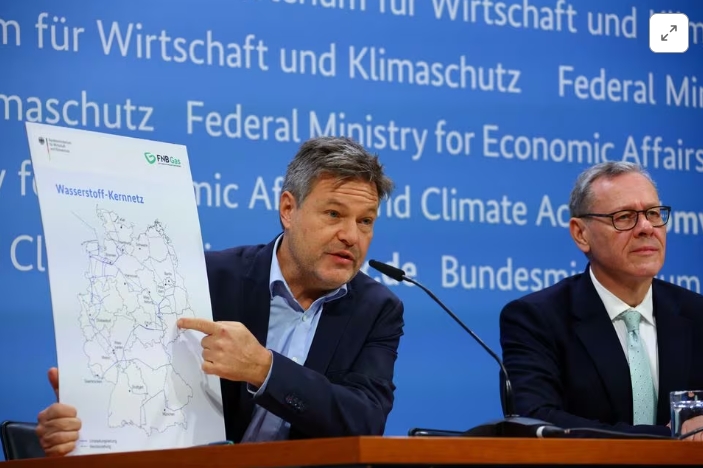
Existing natural gas pipelines will make up 60% of the network, connecting ports, industry, storage facilities and power plants, FNB Gas Chairman Thomas Goessmann told a news conference presenting the network's plans with Economy Minister Robert Habeck. The project will be privately financed.
Germany is seeking to expand reliance on hydrogen as a future energy source to cut greenhouse emissions for highly polluting industrial sectors that cannot be electrified, such as steel and chemicals, and cut dependency on imported fossil fuel.
In July, the German cabinet approved a new hydrogen strategy, setting guidelines for hydrogen production, transport infrastructure and market plans.
The hydrogen network, which will run through all federal states, is a core part of that infrastructure and drilling will start next year, Goessmann added.
"We all know that we have no time to lose and that the first hydrogen must flow as early as 2025 ... The excavators have to roll next year," he said.
In expectation of an acceleration in future demand for the green fuel, the network will be about three time larger than the expected demand in 2030 of some 100 terawatt hours, around a tenth of Germany's annual gas consumption in the years before the 2022 energy crisis.
The government will evaluate the network's plans every two years and adapt accordingly, Habeck said.
The network will be the core of Europe's hydrogen grid and will be connected to Germany's neighbours such as Denmark, Norway and Spain as Berlin expects to import up to 70% of its hydrogen needs.
"Although we will remain an import country, we will significantly reduce our dependence on imports," he said.
A government bill to accelerate hydrogen expansion is expected this year, Habeck said.
The cost of the hydrogen lines should be covered by user fees, but in light of the relatively few users, the government will make advance payments over the next 20 years to keep use affordable and to promote the ramp-up of the hydrogen economy, he added.
The fees should initially be uniform, a draft law seen by Reuters on Tuesday showed.
"The idea ... is that there will then be no distortion of competition in Germany. This means that all customers will pay the same amount for network usage fees," he added.
The cabinet will meet on Wednesday to discuss the network's financing and its regulation, Habeck said.